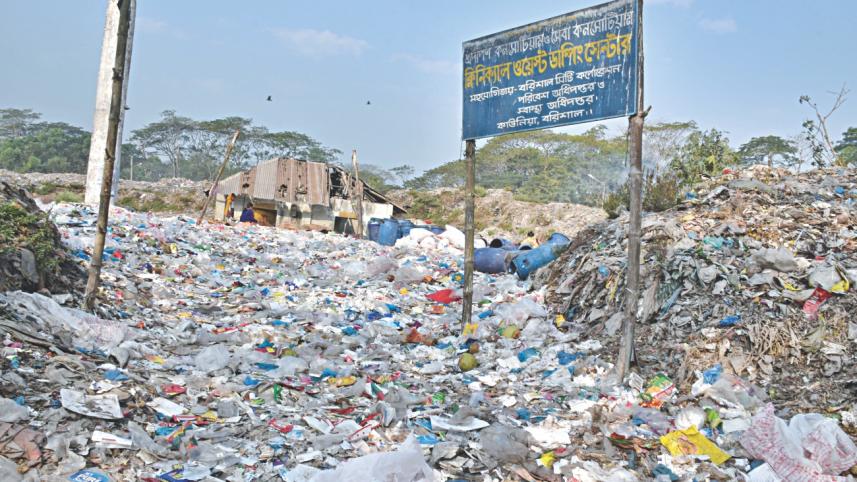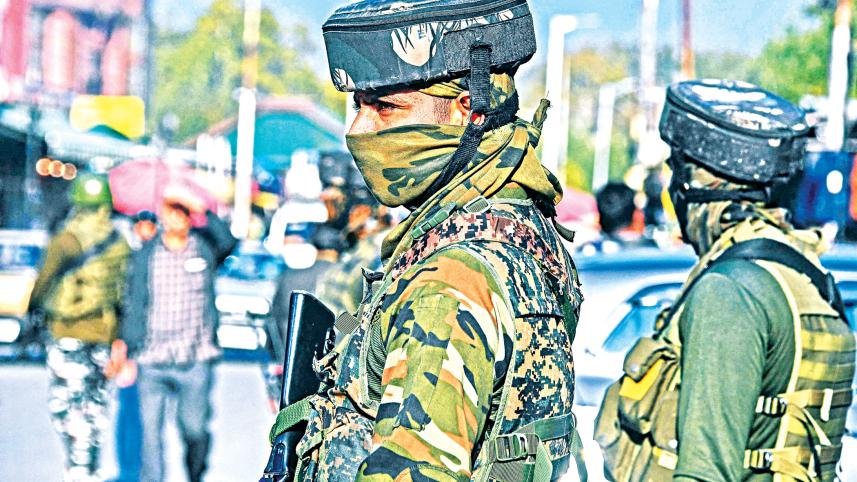Medical waste dumped irresponsibly

Where there are sources that produce medical waste, there should also be means to dispose those of on a regular basis. Unfortunately, in a city like Barishal, there is no such mechanism for doing so, resulting in high risk of public health and environmental degradation.
Every day, at least five tonnes of clinical waste are being produced at four government hospitals, 40 clinics, 182 diagnostic centres, one blood bank and 9 upazila health complexes, according to officials.
Workers of Barishal City Corporation (BCC) and an NGO collect those from the government and private health care institutions respectively. After collection, they just dump the toxic waste on a six-acre landfill in the city’s Puranpara-Gauashar area.
During a recent visit, the collectors were seen piling up all sorts of medical waste in a corner of the landfill. There were also quite a few child ragpickers among them.

Not just used syringes, bandages, dressings, saline bags and needles, even amputated parts of human body, stool, urine, blood, expired medicine and various ingredients used for medical services, and disposable and non-disposable items were found there.
According to Barishal Civil Surgeon Monwar Hossain, this type of open dumping is extremely dangerous to human health.
Besides, over 100 families live around the landfill. Several children were seen walking on the piles, putting themselves at risk of injuries inflicted by hidden sharp objects.
This correspondent saw the workers leaving the spot after dumping the waste. Locals said this has been going on for years.
According to the civil surgeon, clinical waste has to be segregated into two parts -- infectious and hazardous; and those have to be crushed and burnt in an incinerator.
But there is no incinerator plant in Barishal to properly dispose of such hazardous materials.
In recent years, the city has experienced a dramatic increase in the amount of medical waste being generated. It used to be 2.5 tonnes around 10 years ago, said Dipok Lal Mridha, former conservancy officer of BCC.
Dr Rabiul Islam, the incumbent officer, said, “With the increase in population, and consequently healthcare facilities, the amount is now almost double.”
THE HEALTH HAZARD
Doctors and health experts said dumping such medical waste out in the open could be hazardous for those exposed to it. These waste may spread several contagious diseases, including hepatitis B and hepatitis C, tuberculosis, and malaria. Infected syringes and scalpels could cause fatal diseases like HIV/AIDS.
“Pathogens, substances mixed with chemicals, and pharmaceutical, pathological and genotoxic waste put people at risk of being infected with various viruses like hepatitis B and C, and even HIV,” said Shymal Krishna Mandal, assistant director of Directorate General of Health Services, Barishal.
Such open dumping may also spread contagious diseases, he further said.
Civil surgeon Monwar Hossain said people, especially health workers and those living around the landfill, are more vulnerable to those diseases.
IMPACT ON ENVIRONMENT
Dumping medical waste in the open is not only hazardous to health, but also harmful to the environment. Once the waste is shifted to a landfill, it becomes even more hazardous, said environmentalists.
Infectious blood tossed inside a landfill ruins soil for miles and pathogens contaminate healthy drinking water supplies and fresh air, they added.
According to World Health Organization (WHO), disposal of untreated medical waste in landfills can lead to the contamination of drinking, surface, and ground waters if those landfills are not properly constructed.
A 7km canal -- Sapanial Khal -- is flowing around the Puranpara landfill. Starting from Kalibabur canal, the waterbody merges with Lakutia canal, which flows into Sandhya river.
Arefin Badol, deputy director at the Department of Environment, Barishal, said lack of an incinerator to dispose of the clinical waste properly may cause a long-term serious health and environmental crisis for the six lakh residents.
Lincoln Bayen, divisional coordinator of Bangladesh Environmental Lawyers Association (Bela), said a landfill should be set-up far from a residential area.
Echoing him, green activist Subhankar Chakrabarty demanded relocation of the landfill.
NGO WORKS IN LIMITED SCALE
Back in 2004, Prodipan, along with 11 other NGOs, started collecting clinical waste from the city. It had also installed a medical waste disposal plant at Puranpara. But the initiative stopped just after two years.
“Our plant got damaged in 2006,” said Mojibor Rahman, manager of Prodipan. “Since then, we are the only ones collecting such waste,” he added.
He said their workers collect medical waste from private health care institutions and leave those at a designated corner of the landfill. “What else can we do? There is no proper way to dispose of the waste.”
“Our workers provide the service in exchange for Tk 500-5,000. In many cases, they find medical waste mixed with regular garbage in waste bins near healthcare facilities,” he said.
GOVT RESPONSIBILITY
Conservancy officer Dr Rabiul Islam said, “The landfill went beyond its capacity six years ago. And medical waste is mostly responsible for this.”
Now, garbage is spreading to nearby land. At least 50 decimal of land has been occupied with garbage, said locals.
“As a result, many had left the area,” said Masud Mia, who lives near the landfill. Around three years ago, Masud said, two locals Enayet Hossain and Kader Khan along with their families shifted to Alekanda and Amanatganj areas as their land was getting filled with waste.
“Many will follow suit if this continues,” he said.
According to activists, it is the city corporation’s responsibility to dispose of clinical waste properly, but they continue to turn a blind eye to the hazardous situation. BCC should have installed a waste disposal plant a long time ago, they added.
Rabiul Islam said, “We were not able to do so due to a lack of fund. But we have already sent a proposal to the LGRD ministry for a modern plant to be installed in Taltoly outside the city.”
Dr Bakir Hossain, director of Sher-e-Bangla Medical College Hospital, the largest healthcare facility in Barishal, where 80 percent of waste are produced, said due to a lack of fund and manpower they failed to dispose of waste on their own. “We have to rely on BCC to remove those.”
BCC Mayor Serniabat Sadiq Abdullah, who took charge in October last year, said Tk 50 crore fund is supposed to be allocated for the city’s modern waste management project this fiscal year.
“Under the project, an incinerator, among other related arrangements, will be ensured,” he added.



 For all latest news, follow The Daily Star's Google News channel.
For all latest news, follow The Daily Star's Google News channel.
Comments